Menu
Tumbleweed Connection at 50
Today marks the 50th anniversary of Elton’s third album, ‘Tumbleweed Connection’.
To celebrate the landmark, a previously unheard jazz version of Come Down In Time has today been unveiled. Limited to just 5,000 copies of 10” vinyl available today from the Official Store, Come Down In Time (Jazz Version) hadn’t been heard for close to 5 decades until this year, when it was uncovered deep in the archives whilst researching rarities for Elton’s forthcoming boxset Elton: Jewel Box. A 50th anniversary vinyl edition of Tumbleweed Connection is also available now.
By John F. Higgins
Leaving behind the lush, British landscapes so poetically put forward on their previous album, Elton and Bernie reached for their sepia-soaked paintbrushes with both hands to evoke the American wild west on the third LP.
“The sound of the album is sepia-tinted, like the cover art,” arranger Paul Buckmaster said in 1996. “When I think of those songs, that is what I see, visually. You think of old western steam trains and you think of clanking wheels on the rails. Hard-bitten creased faces of cowboys with squinty eyes looking off in the distance. You can almost smell the old leather. That’s the feel of the album; it’s very authentic. It’s a tribute to the American Old West.”
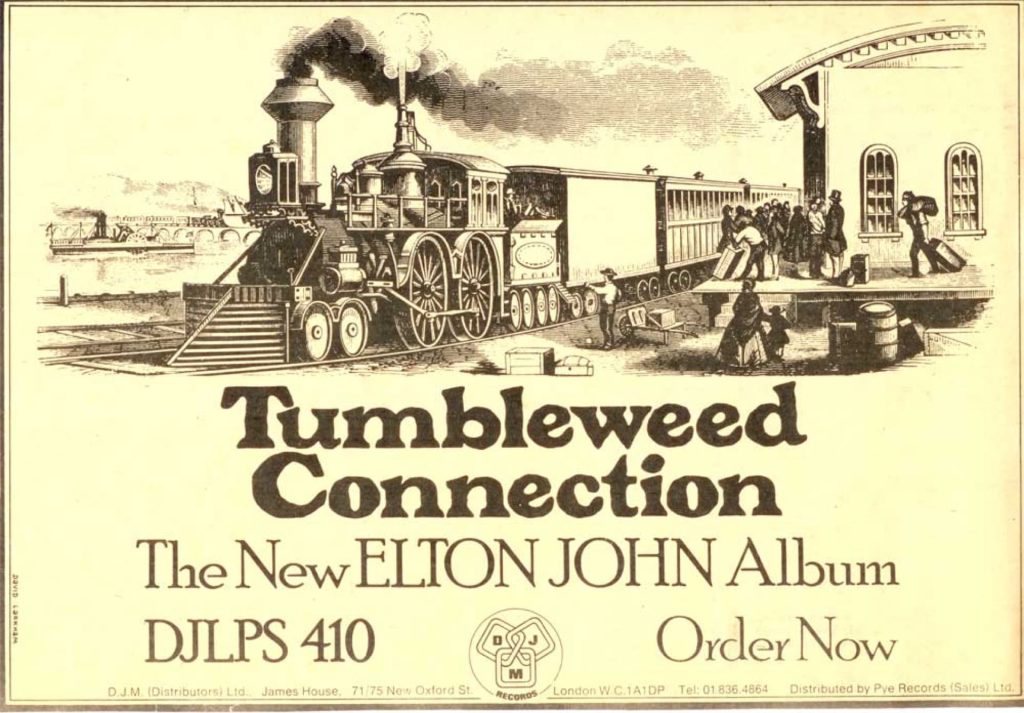
I was determined not to follow up 'Elton John' with another orchestra album, because if I had done that in England, that would be me for life and I wouldn't get in that bag.
Tumbleweed Connection is also a soul-felt homage to The Band and the music of Delaney & Bonnie, whose pianist, Leon Russell, had recently become Elton’s idol. Both American groups had released groundbreaking albums in the summers of 1968 (The Original Delaney & Bonnie) and 1969 (Music From Big Pink), and it does not take much to imagine the minds of Elton and Bernie being blown the moment the U.S. imports arrived at their favourite record-shop, Musicland, in London’s Soho.
Even those native to the United States could be pardoned for reaching for their encyclopedias to look up the many references Bernie included in his lyrics: Pinkertons, Stage Coach Times, Deacon Lee, tramline, and so on. Not all of these were real-life people, places, or things, but the way that the teenage British writer framed them, they all sounded like they were just waiting to be found in in the pages of American history books.
This brings us to perhaps the most amazing thing about the songs, many of which were written at the same time as those on the Elton John album; they were composed before their authors had ever stepped foot on American soil. That was not to happen until almost a month after the album sessions had concluded, when Elton, Bernie, and the band flew to Los Angeles for his debut at the Troubadour.
The sessions between the first two albums Elton recorded at Trident could not have been more different. Whereas the Elton John album was all done in one week, with a great deal of planning beforehand, the Tumbleweed sessions were scattered over a span of four-and-a-half months.
As Paul Buckmaster remembered, “There was a different vibe for Tumbleweed because it was not recorded all at once. We weren’t always available at the same time. Gus may have been on other projects. Elton was probably touring [he performed 30 times in the UK and Europe between March 20 and August 14, 1970]. Maybe studios weren’t available.”
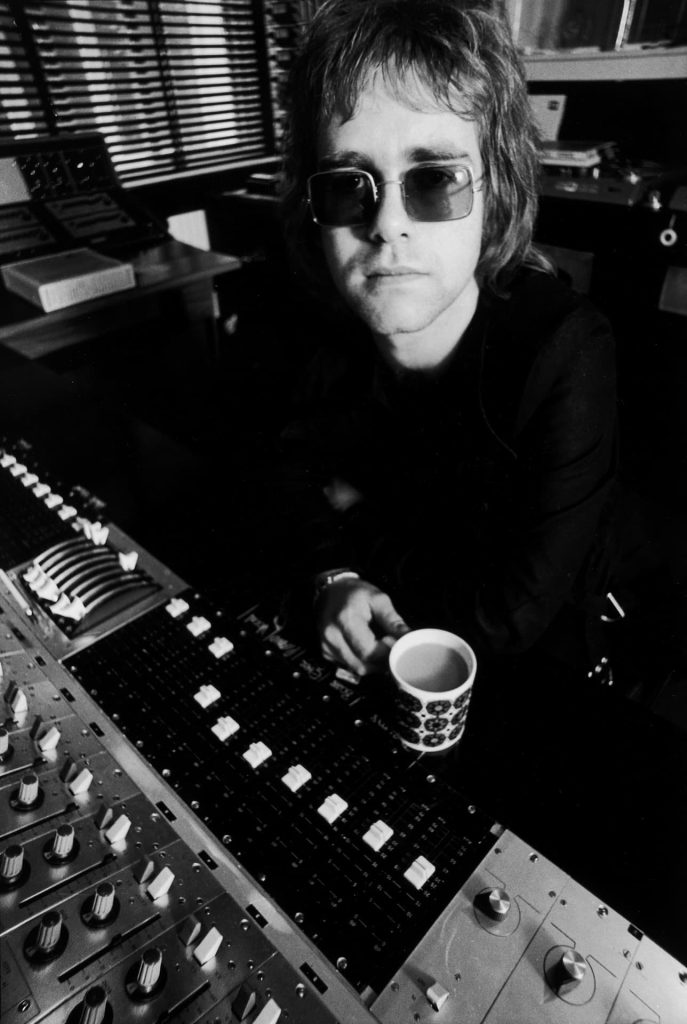
The degree of progression between ‘Elton John’ and ‘Tumbleweed’ is exactly what I wanted. ‘Elton’ was a complicated album, really, whereas ‘Tumbleweed's‘ songs are much simpler, less orchestrated and easier for people to relate to.
Guitarist Caleb Quaye, whose band was used throughout the album, said in 1994 that Elton, who did not have his own group at the time, would join Hookfoot (Caleb on guitar, Roger Pope on drums, David Glover on bass, and Ian Duck on harmonica) on stage at some of their gigs. At the London School of Economics, for example, “he would play some of his songs on stage with us, so we would know the songs already. If Elton was to present something new to us in the studio, it didn’t take us too long to nail it. We were a team; we knew how to work with one another. This was before Walkmans and so on. We didn’t have the opportunity to carry tapes around with us and play them outside the studio. So, we would play around the piano with Elton, live in the studio, when we needed to work out a song.”
Six of the ten songs on Tumbleweed were recorded without much more formality than that; Elton and Hookfoot recorded live in the studio, with the occasional overdub (Caleb on a second, or third guitar, and the like) put on afterwards. Paul Buckmaster fully arranged two of the other songs, with the remaining two being pretty much one-instrument-and-vocal efforts.
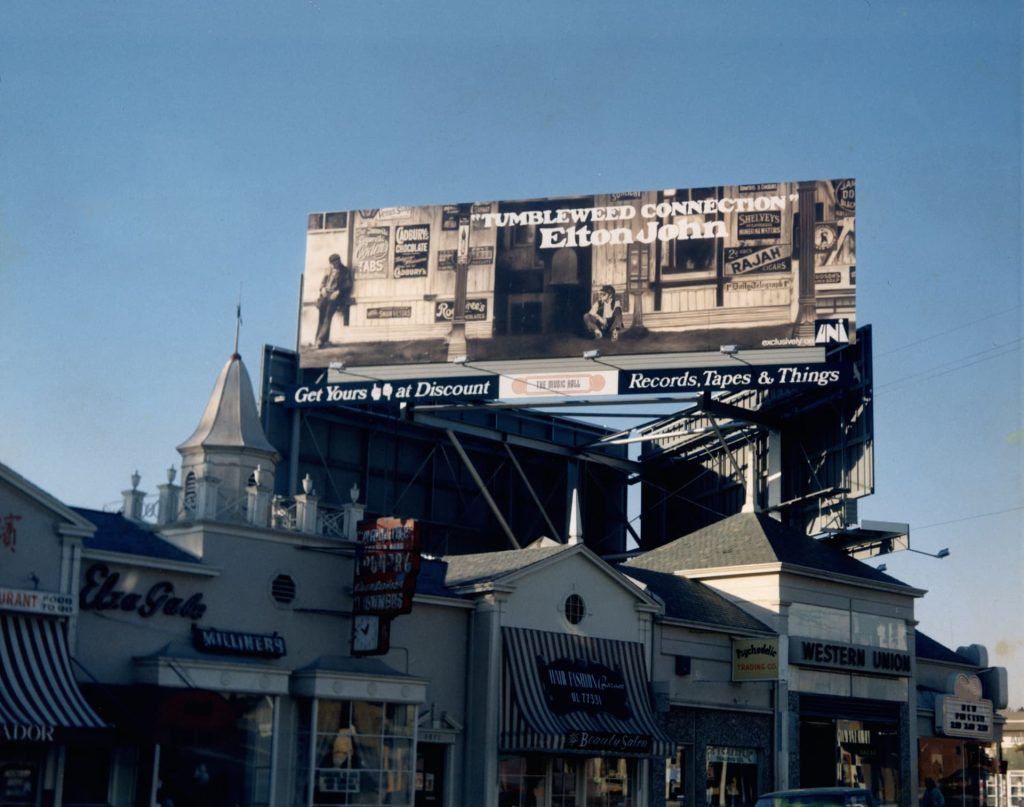
I'm so pleased about the 'Tumbleweed' reviews. Because the 'Elton John' album got ridiculous reviews and I thought well it'll never happen with the new one, perhaps people will accept it but that's all but instead, 'Tumbleweed' got even better reviews. I don't know. We didn't set out to make it a better album.
The album peaked at #2 on the UK Album Chart, where it began its 20-week run on January 16, 1971. In the US, it reached #5 on the Billboard Top 200, entering on January 23, 1971, and staying on the chart for 37 weeks. It was one of four Elton albums to place in the Top 200 simultaneously in the spring of 1971. Tumbleweed Connection was #458 in Rolling Stone magazine’s “500 Greatest Albums of All Time” in 2012 and is currently certified Platinum in the US.
We played ‘Tumbleweed Connection’ to The Band, and they went berserk. It was such a compliment that I couldn’t believe it.
A selective timeline for ‘Tumbleweed Connection’
- July 11, 1969: Performs Son Of Your Father and two other (non-TC) songs w/Hookfoot on BBC Radio 1 – Symonds on Sunday. Transmitted on July 20.
- July 28, 1969: Performs Son Of Your Father and two other (non-TC) songs w/Hookfoot on BBC Radio 1 – Johnnie Walker Show. Transmitted August 9.
- August-September 1969: Elton and Hookfoot record early takes of Son Of Your Father, Ballad Of A Well-Known Gun, and other non-TC songs at Olympic Studios, London, with Steve Brown producing.
- Autumn 1969: Demo of Ballad Of A Well-Known Gun recorded at Dick James Studios (DJM).
- October-December 1969: Piano demos of Come Down In Time and Talking Old Soldiers recorded at DJM.
- January 23, 1970: Elton John sessions end at Trident Studios.
- March 20, 1970: The first single from Elton John, Border Song, released in UK.
- March 20, 1970: Recording sessions for Tumbleweed Connection begin.
- August 6, 1970: Final songs for Tumbleweed Connection recorded.
- August 25, 1970: Elton performs in the US for the first time.
- October 30, 1970: Tumbleweed Connection released in the UK on DJM.
- January 4, 1971: Tumbleweed Connection released in the US on UNI.
TRACK-BY-TRACK
All songs recorded on 16-track at Trident Studios, London, written by Elton John and Bernie Taupin, and produced by Gus Dudgeon, unless otherwise noted.
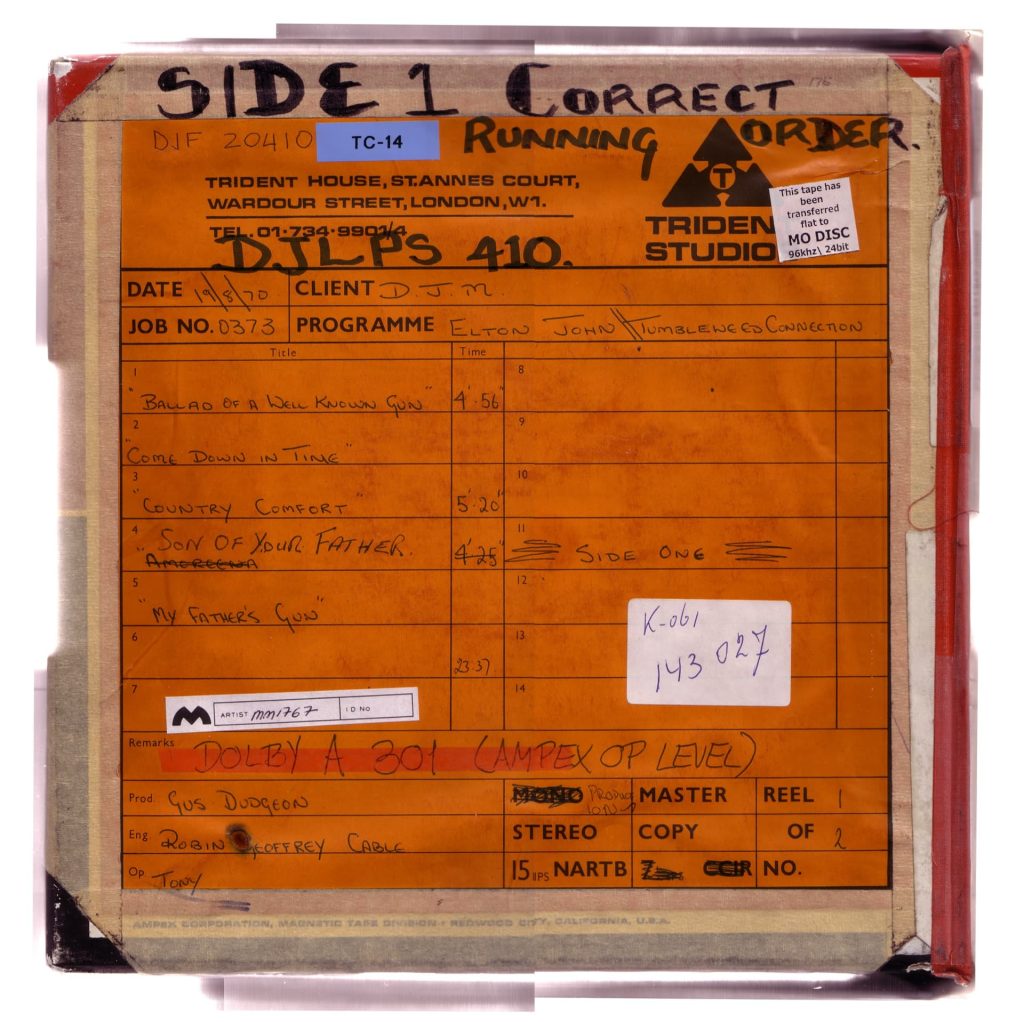
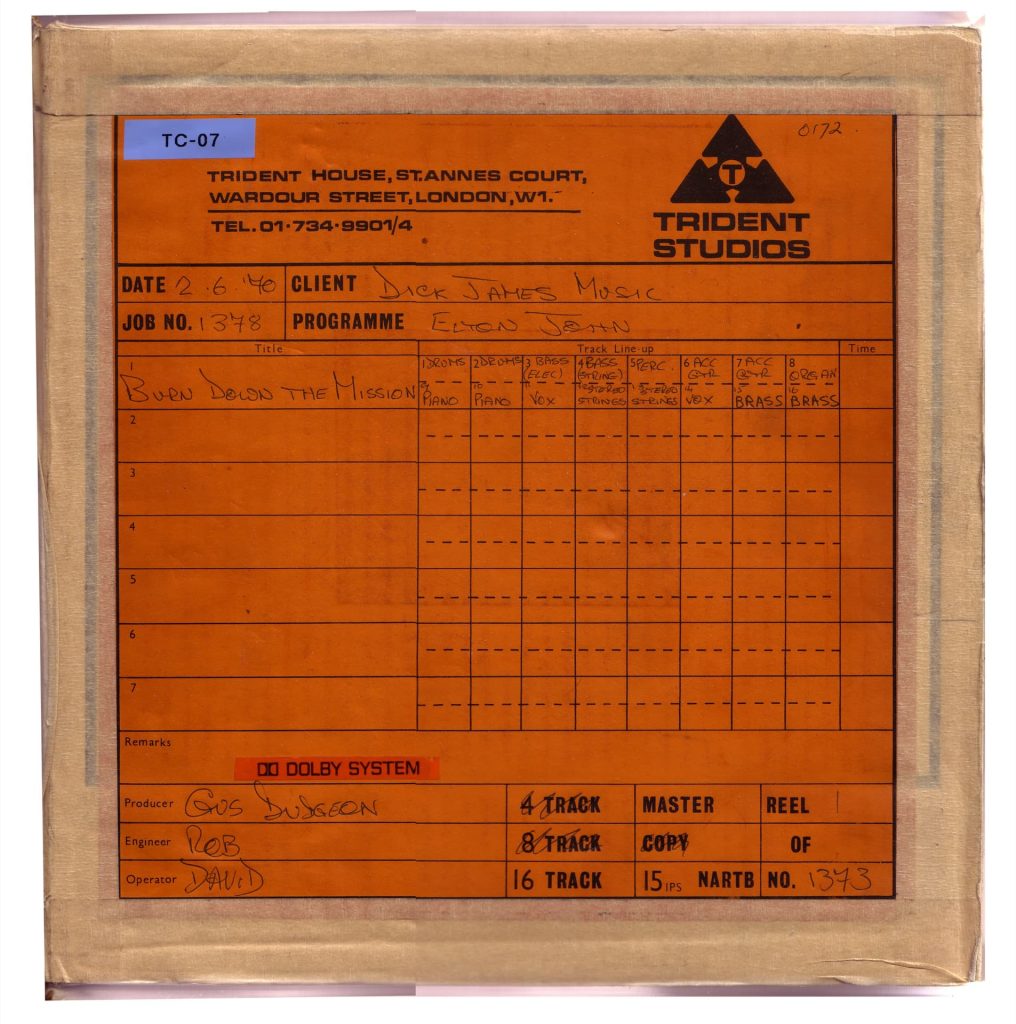
Ballad Of A Well-Known Gun
Recorded: March 20, 1970 (take 4). Backing vocals recorded on April 4.
Musicians
Elton: piano and vocals / Caleb Quaye: acoustic guitar, lead (electric) guitar / Roger Pope: drums / David Glover: bass // Overdubs: Madeline Bell, Tony Burrows, Lesley Duncan, Kay Garner, Tony Hazzard, Dusty Springfield: backing vocals / cowbell.
One of the first songs that Elton and Bernie wrote after Empty Sky. As he was heading into the session after an early playback, Caleb Quaye was asked by Gus Dudgeon to come up with a brand-new guitar part to lead off the song. This, after months of demoing the song in a different way – much faster (not a “ballad”) and with more of a Country feel – than what is on the album. Caleb tuned his Fender Stratocaster down to D (“That’s about the only ‘trick’ I did.”) and came up with the intro on the spot, as well as the solo.
Officially released alternate versions:
- “DJM Demo” from fall 1969 on Come Down In Time (Jazz Version) 10” single (2020).
- There Goes A Well-Known Gun from the Olympic Studio sessions on Tumbleweed Connection Deluxe Edition (2008).
- BBC Radio 1 session, with Hookfoot – Dave Lee Travis show, transmitted on April 12, 1970 – on Tumbleweed Connection Deluxe Edition (2008).
- Live version from March 25, 2007 on Elton 60 – Live at Madison Square Garden.
Come Down In Time
Recorded: June 11, 1970 (morning session).
Musicians
Elton: vocals / Les Thatcher: acoustic guitar / Chris Laurence: acoustic bass / Herbie Flowers: bass guitar / Barry Morgan: drums / Paul Buckmaster: orchestral and band arrangements // Overdubs: Skaila Kanga: harp / Karl Jenkins: oboe / orchestra.
Paul Buckmaster: “I get a lot of compliments about that one because of the arrangement.” Purportedly written for the same person, Valerie, as First Episode At Hienton, this song contains one of the rare instances of an orphan final verse in a Bernie lyric. The end of the song was taken from a previous take.
Officially released alternate versions:
- Piano/vocal demo on Tumbleweed Connection Deluxe Edition (2008).
- March 20, 1970 “jazz version” on Come Down In Time (Jazz Version) 10” single (2020).
- On both of these, the music extends beyond the final lyric line.
“
Country Comfort
Recorded: June 11, 1970 (2nd session, after a discarded attempt earlier in the day).
Musicians
Elton: piano and vocals / Caleb Quaye: acoustic guitar / Les Thatcher: acoustic 12-string guitar / Barry Morgan: drums / Herbie Flowers: bass guitar / Ian Duck: harmonica // Overdubs: Johnny Van Derek: violin / Gordon Huntley: steel guitar / Dee Murray, Nigel Olsson: backing vocals.
The only single released from the album, and only in Australia, New Zealand, and Brazil. Rod Stewart covered this song on his 1970 album Gasoline Alley, which was released before Tumbleweed Connection.
Officially released alternate versions:
- Piano/vocal demo on Tumbleweed Connection Deluxe Edition (2008).
- Live version on 17-11-70 Record Store Day release (2017).
- Live version from May 16, 1974 at the Royal Festival Hall on Here And There reissue (1995).
Son Of Your Father
Recorded: March 23, 1970.
Originally placed as Side 2, song 3, in the album running order; changed at the last minute.
Musicians
Elton: piano and vocals / Caleb Quaye: electric lead guitar / Roger Pope: drums / David Glover: bass / Ian Duck: harmonica (2 passes) / Paul Buckmaster: horn arrangement // Overdubs: Madeline Bell, Lesley Duncan, Kay Garner, Tammy Hunt, Sue & Sunny: backing vocals / horns (saxophones, tuba, bass and tenor trombones, trumpets).
The chorus has one of Bernie’s few internal rhymes: “With blood and water, bricks and mortar / He built for you a home.” Backing singers Sue Glover and Sunny Leslie were members of the British group, The Brotherhood of Man.
Officially released alternate versions:
- Piano/vocal demo on Tumbleweed Connection Deluxe Edition (2008).
My Father’s Gun
UK copyright registration: March 25, 1970
Recorded: March 23, 1970 (2nd session, after a discarded attempt earlier in the day). Backing vocals recorded on April 4.
Musicians
Elton: piano and vocals / Caleb Quaye: acoustic and (uncredited) electric guitars / Roger Pope: drums / David Glover: bass / Ian Duck: harmonica / Paul Buckmaster: horn and (uncredited) string arrangements // Overdubs: Madeline Bell, Tony Burrows, Lesley Duncan, Kay Garner, Tony Hazzard, Dusty Springfield: backing vocals / strings (violins, cello, violas) / horns (tuba, bass and tenor trombones, flugelhorns).
“Probably the last track that we wrote for Tumbleweed,” Elton said in 1971. A New Orleans funeral march, the lyric is written from the perspective of a doomed Confederate soldier from the American Civil War – a landscape Bernie would return to in future works, including Gone To Shiloh from 2010’s The Union.
Officially released alternate versions:
- Piano/vocal demo on Elton: Jewel Box (2020).
- Solo BBC Radio 1 session – Dave Lee Travis show, transmitted on April 12, 1970 – on Tumbleweed Connection Deluxe Edition (2008).
- Live version on 17-11-70 Record Store Day release (2017).
Where To Now St. Peter?
Recorded: August 6, 1970 (take 12).
Musicians
Elton: piano and vocals / Caleb Quaye: acoustic guitar, lead (Leslie) guitar / Roger Pope: drums / David Glover: bass // Overdubs: Dee Murray, Nigel Olsson: backing vocals.
Paul Buckmaster had hoped to orchestrate this track, but “I couldn’t work on everything.” An alternate mix of this song appears on the original UK vinyl pressings of Tumbleweed Connection. It is just about the only Elton song that closes with a repeat of the opening lyric line.
Officially released alternate versions:
- Live version from March 25, 2007 on Elton 60 – Live at Madison Square Garden.
Love Song
(recorded as ”Love Song (Do You Know What I Mean)”)
Written by Lesley Duncan
Recorded (8-track): May 11, 1970.
Musicians
Elton: lead and backing vocals / Lesley Duncan: acoustic guitar, backing vocals.
This track includes a very rare fade-in, no less than six layers of vocals by Elton and Lesley, and what is most likely a BBC stock recording of children playing on a beach. It has been performed live on Elton’s 1971 tour, with Lesley Duncan at the Royal Festival Hall on May 18, 1974 (appearing on his Here And There live album), and then again on tours in 1976 and 1986, with Elton on acoustic guitar! In 1992, Elton performed the ballad with Neil Young, James Taylor, Shawn Colvin, and others at the Bridge School Benefit concert in California.
Amoreena
UK copyright registration: March 17, 1970
Recorded: August 6, 1970 (2nd session) (first attempt on 2nd session of June 11 discarded).
Originally placed as Side 1, song 4 in the running order; changed at the last minute.
Musicians
Elton: piano, Hammond organ, vocals / Caleb Quaye: lead (Leslie) and electric guitars / Dee Murray: bass guitar /Nigel Olsson: drums.
The first Elton recording to include his future rhythm section of Nigel Olsson and Dee Murray, the song is Elton’s musical nod to Van Morrison. Elton and Bernie said to then-manager Ray Williams that if he named his daughter Amoreena, they would write a song with that title. She later became Elton’s goddaughter. In 1975, it was featured in the opening scene of the film Dog Day Afternoon.
Officially released alternate versions:
- Piano/vocal demo on Elton: Jewel Box (2020).
- BBC Session recording, with Nigel and Dee – transmitted on Sounds Of The Seventies on July 7, 1970, on Tumbleweed Connection Deluxe Edition (2008).
- Live version on 1996 reissue of 17-11-70.
- Taron Egerton version on Rocketman – The Original Motion Picture Soundtrack.
Talking Old Soldiers
Recorded (8-track): May 11, 1970 (first attempt on April 15 discarded).
Musicians
Elton: piano and vocals.
The first and still one of only a few piano-and-vocal only songs in Elton’s catalogue. Originally attempted 5 days after the Elton John album was released in the UK, and 6 days before Elton, Nigel and Dee supported T Rex at The Roundhouse for Pop Proms – the only song tried that day. The final master was recorded a month later at the same session as Love Song – so a rather “stripped-down” day, musically. Inspired by the songs of David Ackles, who would open for Elton at his American debut in August and in 1972 release an album produced by Bernie, American Gothic.
Officially released alternate versions:
- Piano/vocal demo on Tumbleweed Connection Deluxe Edition (2008). The music on the demo extends longer beyond the final lyric than the album version.
Burn Down The Mission
UK copyright registration: April 10, 1970
Recorded: June 2, 1970.
Musicians
Elton: piano, vocals, backing vocals / Les Thatcher: acoustic guitar / Mike Egan: acoustic guitar / Chris Laurence: acoustic bass / Herbie Flowers: bass guitar / Barry Morgan: drums / Robin Jones: congas, tambourine / Brian Dee: organ / Paul Buckmaster: orchestral, horn and band arrangements // Overdubs: orchestra and horns.
Elton’s musical homage to the piano playing and songwriting of two of his primary influences at the time: Leon Russell and, “even the first chords of Burn Down The Mission are kind of a Laura Nyro pinch,” Elton said on Elvis Costello: Spectacle in 2008. The tempo and style changes within the song were also inspired by the American singer-songwriter.
Officially released alternate versions:
- Piano/vocal demo on Elton: Jewel Box (2020).
- BBC Session recording, with Nigel and Dee – transmitted on Sounds Of The Seventies on July 7, 1970, on Tumbleweed Connection Deluxe Edition (2008).
- Live version on 17-11-70.
- Live version from May 16, 1974 at the Royal Festival Hall on Here And There reissue (1995).
- Live version from December 14, 1986 in Sydney on Live in Australia with the Melbourne Symphony Orchestra (1987).
- Live version from March 25, 2007 on Elton 60 – Live at Madison Square Garden.
ADDITIONAL TRACKS
Into The Old Man’s Shoes
Recorded: March 23, 1970.
Originally released as the B-side to Your Song in the UK (1971).
Musicians
Elton: piano and lead and double-track vocals / Caleb Quaye: acoustic and electric guitars / Roger Pope: drums / David Glover: bass / Paul Buckmaster: orchestral arrangement // Overdubs: orchestra.
Officially released alternate versions:
- Piano/vocal demo on Tumbleweed Connection Deluxe Edition (2008) – includes an extra verse.
Madman Across The Water (original version)
UK copyright registration: April 10, 1970
Recorded: May 18, 1970.
First released on Rare Masters, 1992.
Musicians
Elton: piano and vocals / Michael Chapman: acoustic guitar / Mick Ronson: electric guitar / Barry Morgan: drums / Herbie Flowers: electric bass.
Gus Dudgeon: What happened was, when Elton played me the song, that [sings opening guitar lick] he said, “Right, that lick, I don’t hear it on piano.” So I said, “Okay, on what?” So he said, ”’Well, I really think it’s a guitar lick.” I said, “But you realize that’s very complicated.” And he said, “Well, I actually hear it on acoustic.” And I went, “Oh man, now this is really complicated!” I said, “I only know one guy that I’ve worked with who I think could rattle that off, Michael Chapman.” He knew Michael Chapman because he’d bought his album that I did [Fully Qualified Survivor], which Ronson had played on. He liked Michael’s album a lot.
I rang Mike up and I said, “Can you come down and do a session for me?” He put up a lot of resistance. He kept saying, [mumbling] “Oh, I don’t know about fucking playing on Elton John. Oh, he’s big time…” Mike, bless him, was just a little old folky, basically. But I talked him around and he came down and he carried it off with pretty good aplomb. That “boom-ching!” part [sings end of riff] is a harmonic, right? And it’s quite complicated to do that and to keep it going with any sort of feel.
So, we cut the track. Now, Ronson was there because he became the natural extension from Michael. I thought, “Well, there’s no lead guitarist in the band,” at that time. Caleb Quaye, for some reason, we didn’t use him. I don’t know, maybe he was on tour or something. I thought, “Well, Ronson was great on Chapman’s album. They can hold each other’s hand.” They both were going to be a bit nervous about working with Elton.
Come Down In Time (Jazz Version)
Recorded: March 20, 1970 (take 2).
Previously unreleased.
Musicians
Elton: piano and vocals / Caleb Quaye: guitar / Roger Pope: drums / David Glover: electric bass.
“We did Come Down in Time with the rhythm section, which was Caleb and Roger and Gloves [David Glover],” Gus recalled in 1993. “We were pretty happy with that version, actually. But we played the song to Buckmaster and Buckmaster said, ‘I have to arrange that song. But I’d like to write [all] the parts.’ And I said, ‘Why?’ And he went, ‘Because I think I could do something with it that’s different.’ I thought nothing lost nothing gained. Who knows? So, he wrote the whole rhythm section – wrote all the rhythm section parts. We just simply re-did it, and we both went, ‘You’re absolutely right. It’s a much better version.’ So, there is a version which was never released, needless to say.”
Ballad Of A Well-Known Gun (DJM demo)
Recorded: Autumn 1969 at DJM Studios, London.
Produced by Steve Brown.
Previously unreleased.
Musicians
Elton: piano and vocals / Caleb Quaye: guitar / Gordon Huntley: steel guitar / Roger Pope: drums / Clive Franks: bass.
EltonJohn.com thanks David Bodoh and the Elton John Archives for their research assistance.
